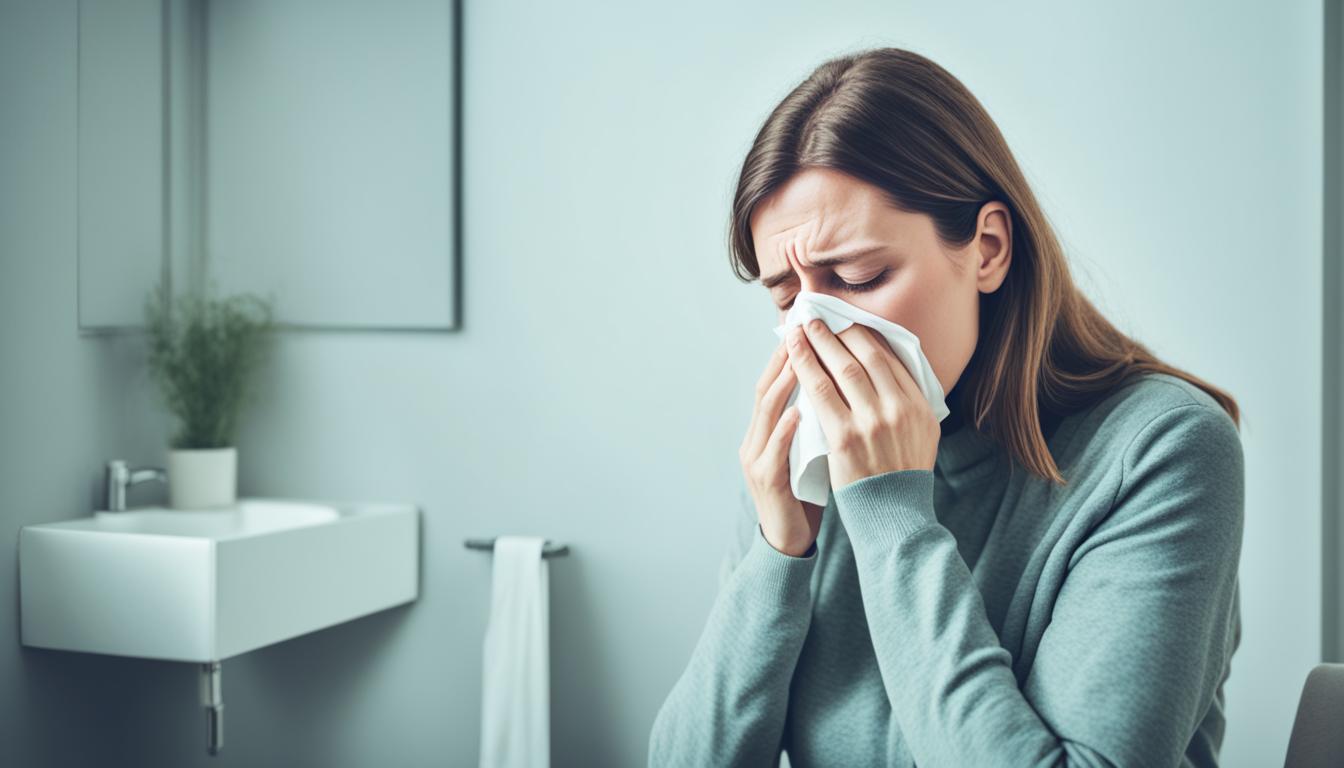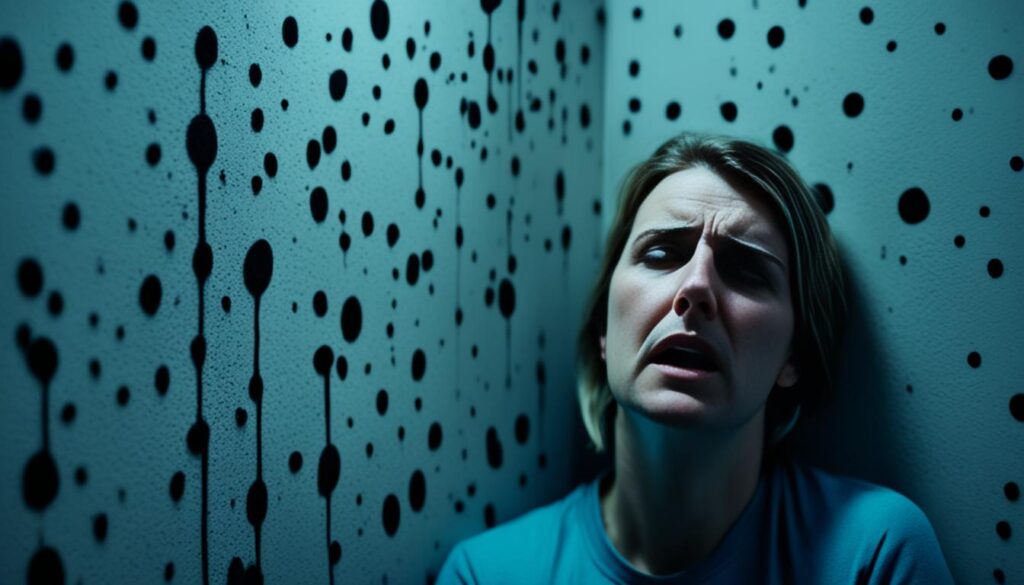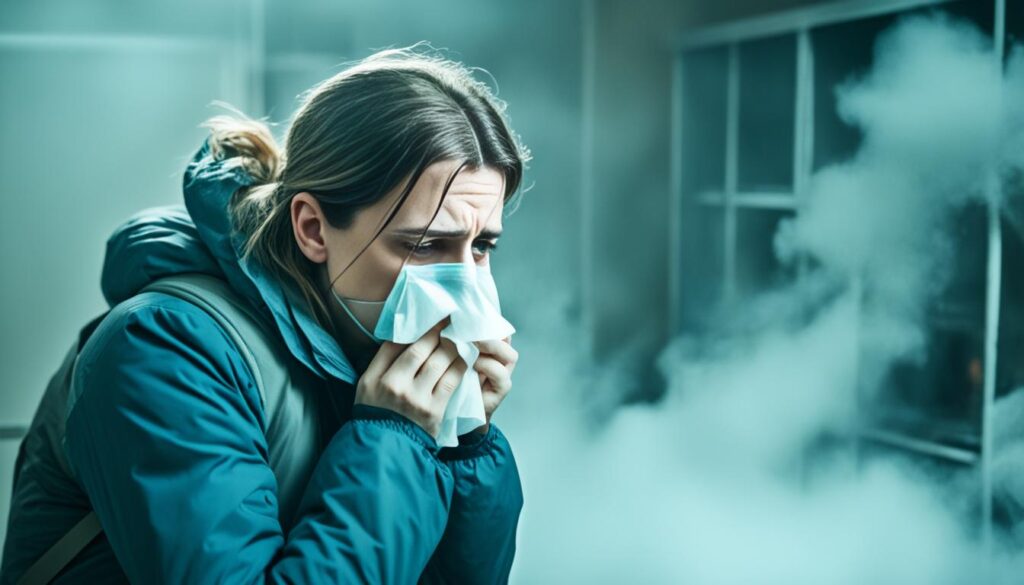
Recognizing Symptoms of Mold Exposure Effectively
When it comes to maintaining a healthy living environment, recognizing the symptoms of mold exposure is crucial. Mold, a type of fungus that thrives in damp and humid conditions, can pose various health risks if left untreated. By understanding the signs of mold exposure, you can take proactive measures to protect yourself and your loved ones.
Key Takeaways:
- Recognizing the symptoms of mold exposure is essential for safeguarding your well-being.
- Mold can cause respiratory issues, allergies, and other health problems.
- Common signs of mold exposure include coughing, wheezing, and skin irritation.
- If you suspect mold in your environment, seek professional assistance for a thorough assessment.
- Taking proactive measures, such as maintaining proper moisture levels, can help prevent mold growth.
Common Symptoms of Mold Exposure
When it comes to mold exposure, recognizing the common symptoms is essential for protecting your health. The signs can vary from person to person, but being aware of these indicators can help you identify if mold is present in your environment. Here are some of the most frequently reported symptoms:
- Allergic reactions: Many individuals experience allergic reactions when exposed to mold. These reactions can include sneezing, coughing, itchy or watery eyes, and a runny or congested nose.
- Respiratory issues: Mold exposure can also impact the respiratory system, leading to symptoms such as wheezing, shortness of breath, chest tightness, and throat irritation.
- Skin irritation: Some people may develop skin irritation or rashes after being exposed to mold. This can manifest as redness, itching, or a burning sensation on the skin.
- Headaches and fatigue: Mold exposure has been linked to frequent headaches and persistent fatigue. If you find yourself experiencing these symptoms regularly, it’s worth considering if mold could be a contributing factor.
- Digestive problems: In certain cases, mold exposure can lead to digestive issues such as nausea, diarrhea, or abdominal pain.
If you are experiencing any combination of these symptoms and suspect mold exposure, it is crucial to take action. Seeking professional help, like the services provided by Fix Mold Miami at 305-465-6653, can assist in identifying and addressing the root cause of the problem.
Remember, understanding the common symptoms of mold exposure is the first step towards creating a healthier living environment for you and your loved ones.

Health Effects of Mold Exposure
Mold has far-reaching health effects that can significantly impact individuals exposed to it. Understanding these effects is essential for identifying and addressing mold-related issues promptly, ensuring the well-being of yourself and your loved ones.
One of the primary health concerns associated with mold exposure is respiratory issues. The inhalation of mold spores can trigger or exacerbate respiratory conditions, such as asthma and allergies. Common symptoms include coughing, sneezing, wheezing, and shortness of breath. Individuals with pre-existing respiratory conditions are particularly vulnerable to the respiratory effects of mold exposure.
Mold exposure can also have adverse effects on overall health and well-being. Prolonged exposure to mold can lead to fatigue, headaches, and difficulty concentrating. These symptoms can significantly impact daily life and productivity, causing discomfort and hindering performance in various aspects of life.
In some cases, mold exposure can also cause skin irritation and allergic reactions. Skin rashes, hives, and itching are common manifestations of mold-related allergies. If you notice any skin abnormalities or persistent allergic reactions, it is crucial to consider the possibility of mold contamination in your environment.
“The health effects of mold exposure vary depending on individual sensitivity and the extent of exposure. It is crucial to address mold issues promptly to mitigate potential health risks.”
Furthermore, prolonged exposure to certain types of mold, such as black mold (Stachybotrys chartarum), has been associated with more severe health effects. Research suggests that black mold exposure may lead to respiratory problems, chronic fatigue, and even neurological issues in some cases. Therefore, it is crucial to address any signs of black mold contamination promptly and seek professional assistance for remediation.
Recognizing and addressing the health effects of mold exposure is crucial for maintaining a safe and healthy living environment. If you suspect mold in your home or workplace, it is recommended to consult with professionals specializing in mold assessment and remediation. Taking proactive measures and seeking expert assistance can help ensure that you and your loved ones are protected from the potential hazards of mold exposure.

Preventing Mold Exposure
While it is impossible to eliminate mold entirely, there are steps you can take to minimize exposure and prevent its growth. Here are some essential tips:
- Keep humidity levels in your home below 50% by using dehumidifiers or air conditioning.
- Fix any leaks or water damage promptly to prevent mold growth.
- Ensure proper ventilation in areas prone to moisture, such as bathrooms and kitchens.
- Clean and dry any water-damaged materials or items within 24-48 hours.
- Regularly inspect and clean areas susceptible to mold growth, such as basements and crawlspaces.
- Use mold-resistant materials when renovating or building.
- Remove clutter and unnecessary moisture sources.
By following these preventive measures and being vigilant about potential mold issues, you can create a healthier and mold-free environment for yourself and your family.
Conclusion
In conclusion, recognizing the symptoms of mold exposure is paramount for safeguarding your health. By understanding the common indicators and potential health effects, you can take proactive measures to prevent mold growth and protect yourself and your loved ones. In case you suspect the presence of mold in your environment, it is essential to seek professional assistance.
If you are living in the Miami area and need reliable help with mold-related issues, consider reaching out to Fix Mold Miami. With their expertise and thorough mold assessment services, they can help you identify the extent of the problem and provide effective solutions. Don’t delay taking steps towards a healthier living space.
Contact Fix Mold Miami at 305-465-6653 to schedule a comprehensive mold assessment today, and ensure a healthier environment for yourself and your family.




